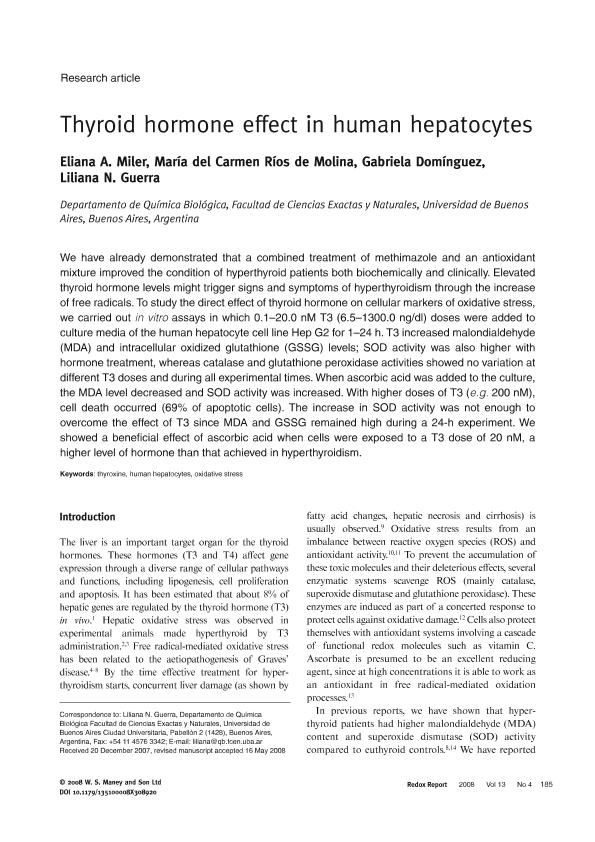Artículo
Thyroid hormone effect in human hepatocytes
Fecha de publicación:
12/2008
Editorial:
Taylor & Francis
Revista:
Redox Report
ISSN:
1351-0002
Idioma:
Inglés
Tipo de recurso:
Artículo publicado
Clasificación temática:
Resumen
We have already demonstrated that a combined treatment of methimazole and an antioxidant mixture improved the condition of hyperthyroid patients both biochemically and clinically. Elevated thyroid hormone levels might trigger signs and symptoms of hyperthyroidism through the increase of free radicals. To study the direct effect of thyroid hormone on cellular markers of oxidative stress, we carried out in vitro assays in which 0.1-20.0 nM T3 (6.5-1300.0 ng/dl) doses were added to culture media of the human hepatocyte cell line Hep G2 for 1-24 h. T3 increased malondialdehyde (MDA) and intracellular oxidized glutathione (GSSG) levels; SOD activity was also higher with hormone treatment, whereas catalase and glutathione peroxidase activities showed no variation at different T3 doses and during all experimental times. When ascorbic acid was added to the culture, the MDA level decreased and SOD activity was increased. With higher doses of T3 (e.g. 200 nM), cell death occurred (69% of apoptotic cells). The increase in SOD activity was not enough to overcome the effect of T3 since MDA and GSSG remained high during a 24-h experiment. We showed a beneficial effect of ascorbic acid when cells were exposed to a T3 dose of 20 nM, a higher level of hormone than that achieved in hyperthyroidism.
Palabras clave:
Human Hepatocytes
,
Oxidative Stress
,
Thyroxine
Archivos asociados
Licencia
Identificadores
Colecciones
Articulos(IQUIBICEN)
Articulos de INSTITUTO DE QUIMICA BIOLOGICA DE LA FACULTAD DE CS. EXACTAS Y NATURALES
Articulos de INSTITUTO DE QUIMICA BIOLOGICA DE LA FACULTAD DE CS. EXACTAS Y NATURALES
Articulos(OCA CIUDAD UNIVERSITARIA)
Articulos de OFICINA DE COORDINACION ADMINISTRATIVA CIUDAD UNIVERSITARIA
Articulos de OFICINA DE COORDINACION ADMINISTRATIVA CIUDAD UNIVERSITARIA
Citación
Miler, Eliana Andrea; Rios, Maria del Carmen; Dominguez, Gabriela; Guerra, Liliana Noemi; Thyroid hormone effect in human hepatocytes; Taylor & Francis; Redox Report; 13; 4; 12-2008; 185-191
Compartir
Altmétricas




